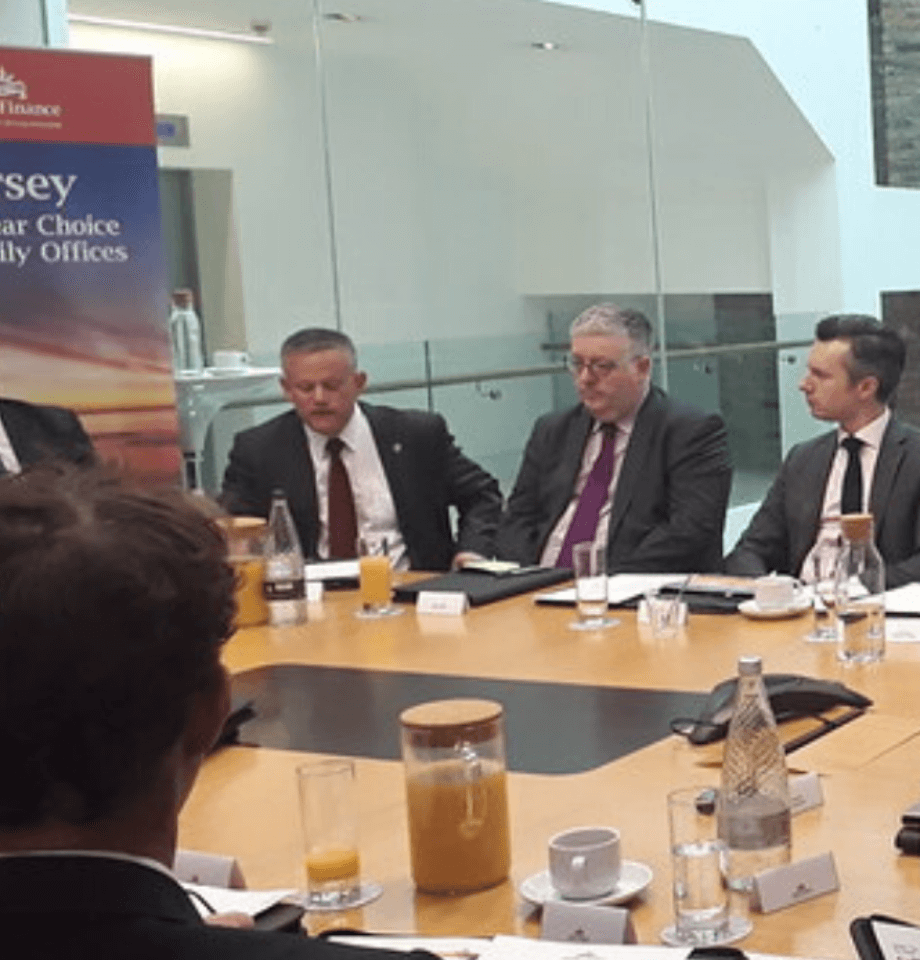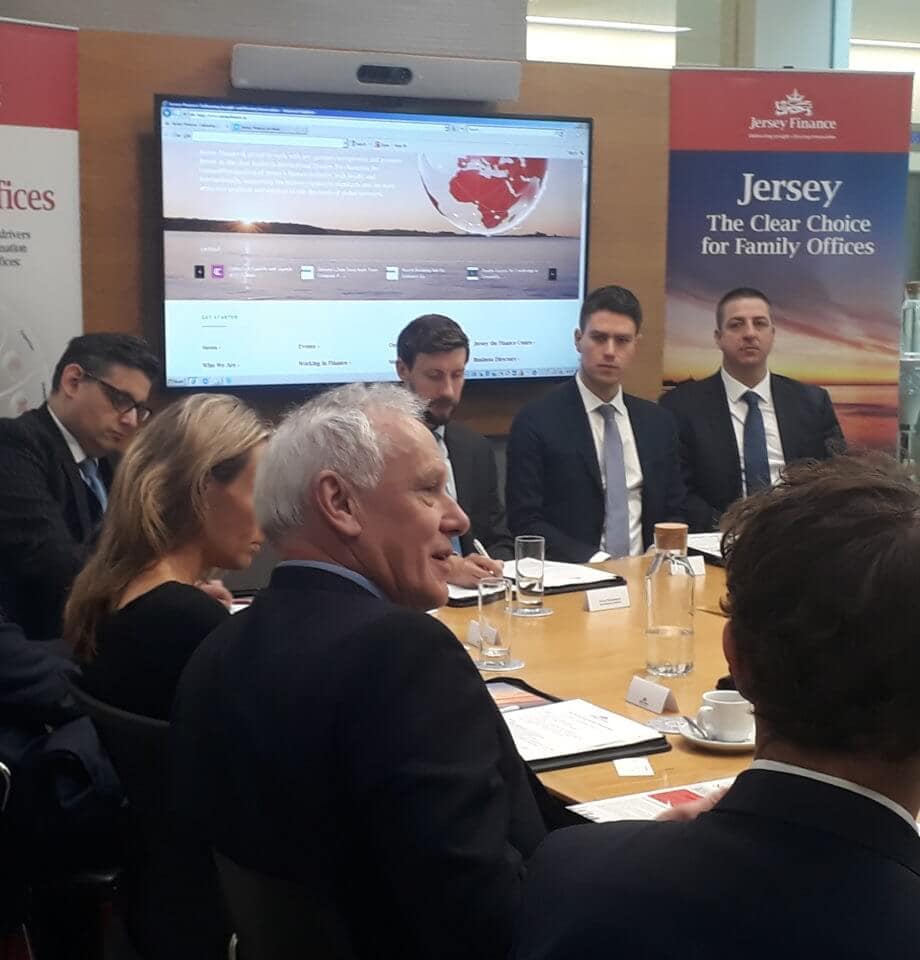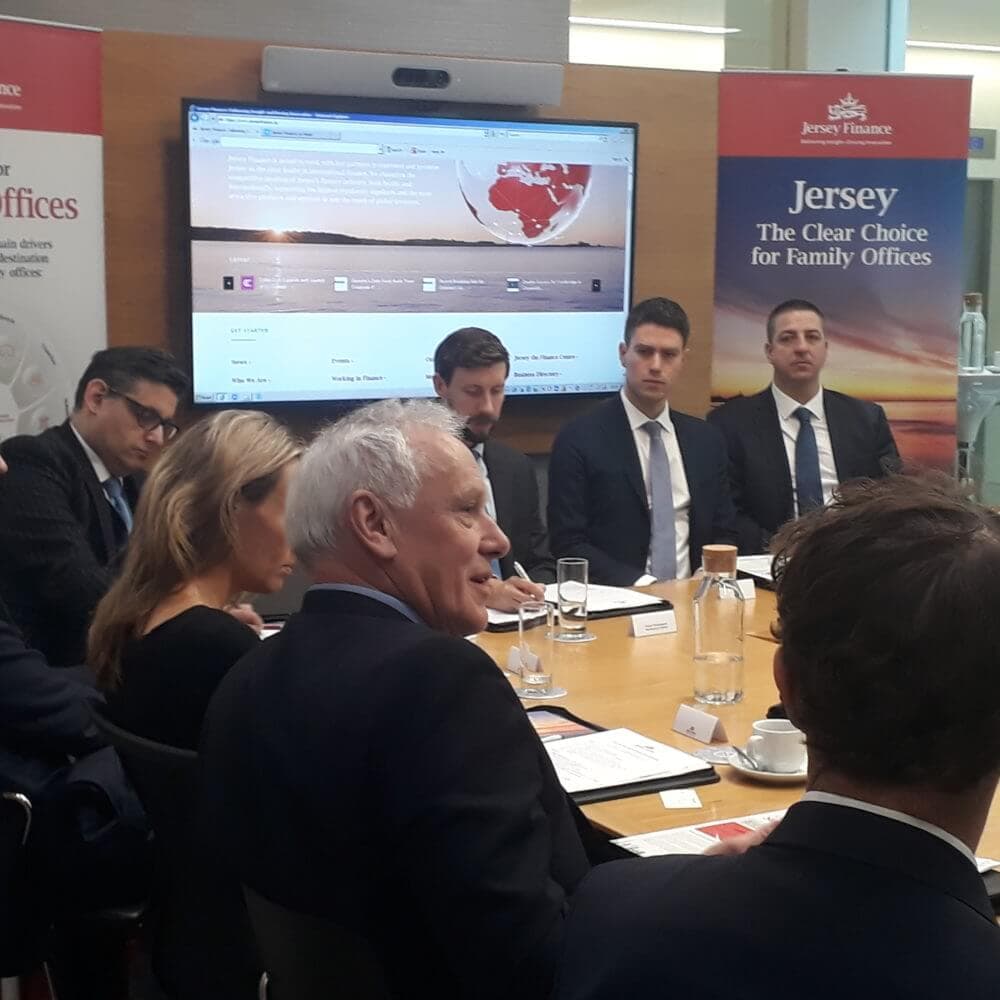About the event
The family office roundtable events are intended to encourage dynamic debates and explorations into what is important for private clients when it comes to establishing, redomiciling or relocating family offices around the globe. Held at Vistra’s London office, this roundtable explored how expertise, economic and political stability are an important consideration for family offices doing business or considering doing business in Jersey.
List of Attendees
- Matthew Braithwaite, Partner, Wedlake Bell LLP
- Carol Katz, Professional Support Lawyer, Mishcon de Reya
- Salpy Kouyoumjian, Partner, Boodle Hatfield LLP
- Ben Lister, Senior Associate, Taylor Wessing
- Chris Marquis, Global Head Private Wealth, Vistra (London)
- Robert Moore, UK Director, Jersey Finance
- Simon Morgan, Director and Head of Private Clients, Vistra (Jersey)
- Steven Rowland, Commercial Director, Vistra (Jersey)
- Phyllis Townsend, Senior Associate Wealth Management, Baker McKenzie
- Philip Turner, Partner, Ashfords LLP
- Thomas Varty, Banker, J.P. Morgan
- Alice Vink, Senior Associate, Stephenson Harwood LLP
- Trevor Warmington, Partner, Rawlinson & Hunter
- Paul Windsor, Managing Director, Crestbridge
- Allan Wood, Head of Business Development, Jersey Finance
- Clive Wright, Managing Director, Vistra (Jersey)
- Iain Younger, Tax Director, Frank Hirth
Expertise found in Jersey
- 25 banks in the island, as of June 2019, deposits of £130 billion, £400 billion in private wealth assets; £342 billion in fund assets.
- Jersey has the highest concentration of STEP Members in the world with 1,300 Members; 21,000 Members of STEP worldwide.
- Jersey’s regulator, the Jersey Financial Services Commission, is highly regarded as a regulator with foresight, open to dialogue with the financial services industry and takes a pragmatic approach to ensure Jersey remains ‘easy to do business with’.
- When evaluating an international finance centre (IFC) on “access to expertise”, Jersey is held in high regard given the significant concentration of appropriately qualified private and corporate wealth professionals with almost 14,000 individuals across the legal, banking, and accounting industries, in addition to the members of the governance institute – ICSA, STEP and the Chartered Institute for Securities and Investment (CISI).
- Due to the Island’s long-established financial services industry, developed financial services centre in the capital of St Helier, local knowledge, high levels of education, training and the adherence to professional standards of Jersey financial services employees, clients acknowledge that the Jersey offering demonstrates economic substance.
- When evaluating the regulatory standards of an IFC, Jersey’s regulator, amongst other matters, prescribes a high threshold for staff dealing with client matters; they have to either be qualified or working towards a qualification as a minimum standard.

“Jersey is so well-placed in terms of its experience and expertise. It’s not all just about assets and governance. Some families want help in simple matters, whether it’s organising insurance on their property or just making sure that somebody looks after their car, that they want to drive around when they’re here in the city, or indeed, just making arrangements for some sort of family event. Jersey, particularly being so well-located to the UK, is able to offer all of that”.
Economic and political stability found in Jersey
- The stability and framework of the Island is supported by its government and regulations.
- Constitutionally – Jersey has been independent for more than 800 years; a crown dependency which is an important distinction from the overseas territories.
- Politically stable – no Party System in Jersey; 50 representatives form a States Assembly. Employees/employers in the financial services industry produce a significant proportion of the revenue from taxation.
- Economy – thriving financial services economy with 50% of GDP from financial services.[1] Jersey was the first jurisdictions to be placed on the EU’s white list for taxation.
[1] Research findings in 2015 revealed the presence of the industry contributed to more than half (57%) of all taxes raised on the Island.

“The IMF, the International Monetary Fund commented, ‘The financial services, the financial sector regulation and supervision are of a high standard and comply well with international standards, placing Jersey in the top division of international financial centres, including those in the G20 and the European Union.’ Finally, the OECD, who we all know confirmed that Jersey received a fully compliant rating, which is the highest possible, when meeting global standards on tax transparency. From a political, constitutional and economic point of view, we can say that Jersey is a very stable environment in which to do business”.
Jersey’s appeal with globally-focussed family offices
- Jersey is custodian of £1.3 trillion of capital and 50% of Jersey’s work is in global markets (Asia, Africa, Gulf Region) which is unique in creating the opportunities for firms operating on-Island to win new family office business.
- The term ‘family office’ is not necessarily used by families to describe the services they use in Jersey. Jersey firms’ work with families range from organising an away-day to complex structuring and domiciliation to the Island; which is essentially family office work.
- For international families who use London as their point of reference, Jersey’s connectivity, understanding of the London market and long-standing relationship with the City is key. The knowledge of the UK market and close working relationship between London and Jersey advisers is advantageous compared to advisers located in other jurisdictions, especially when considering the ever-changing financial environment.
- Jersey Finance’s recently opened New York office creates a platform for Jersey firms to build out operations in the US and for those working with North American family businesses to highlight Jersey’s international reach.
- Access to the regulator in Jersey (the JFSC) enables Jersey firms (e.g. banks, law firms, trust companies) to easily engage and consult on upcoming issues which may affect family businesses.
- Historically, Jersey’s business was driven by instability in a client’s home country. Today, Jersey’s relationship with clients in unstable regions is built on the expertise, experience and stability they find in Jersey to grow and expand their wealth both domestically and internationally.

“Where Jersey comes into its own is when you’re looking at a family globally. Invariably, they have to have a few hubs, and I’m talking about institutional families here. In those different hubs the one place, that often is the perfect place, to pull everything together, tends to be Jersey. Whether that is structurally or operationally. It is quite unique”.
Tax and transparency
- Misconceptions about tax-neutral environments could be resolved through a collective shift in emphasis on the impact and benefits of this environment around the world.
- Structures, for example trusts, advised through Jersey are less tax-driven and more reliant on the expertise available to manage the structures. International clients are led by the quality of the administrative workforce or back office functions.
- The Common Reporting Standard (CRS) sees that Jersey reports with more than 90 countries.[2]
[2] Jersey was an early adopter of the Common Reporting Standard (CRS). A commitment to this standard was made in 2013.

